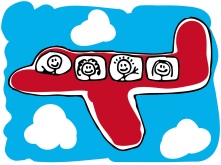 As this is my first blog, I guess the best place to start is the beginning…
As this is my first blog, I guess the best place to start is the beginning…
Following the birth of my son in 2010 I have experienced every emotion imaginable. From wondering if I would ever smile again, to laughter, tears, sadness, joy, tears, loneliness, anger, more tears (yes, there have been many tears), frustration, to name a few. However, the two most surprising aspects so far have been firstly, the lack of direction and information – not knowing how to find and access what seemed like such vital information to help my son get started in his journey of life, and secondly, the varying levels of understanding to a situation such as ours, even within the family unit – but more about that later!
Our story began at 10.23 am on 24 January, 2010 (Sunday). When Harry (Harrison) was born he was pronounced fit and healthy, and we were happy, proud parents – like all parents should be. We enjoyed cuddles with our precious little bundle, and he mostly just slept. That afternoon when the nurse came to check on him he was a little cold. After re-taking Harry’s temperature with two further thermometers and deciding that the low reading was in fact not a result of faulty batteries, he was whisked away to the special care nursery for closer observation.
It was soon noticed that Harry was having periods of apnoea – and would stop breathing. He was put on a “C-PAP” machine, to assist his little lungs, and keep his oxygen levels at a safe level. When we were allowed to visit Harry in the nursery, we were surprised to be given a photograph of him. The nurse explained that she didn’t know if we had a photo of him yet – my first thought was “is this so we have a photo of him while he is ‘alive’ – could he die?”. We stayed with Harry as long as we could and then went back to our room in the hospital ward.
On the third day, Harry had been taken off the C-PAP machine and seemed to be breathing a little better, and we finally received some news about his condition. Our paediatrician told us that Harry was experiencing “seizure activity” and that they were going to give him an anticonvulsant medicine to manage the seizures while the continued with tests to find out the cause. Harry reacted badly to the medicine causing him to have more frequent and longer periods of apnoea, resulting in him being transferred to another hospital where they had a neonatal intensive care unit, where he could be ventilated.
That night Harry underwent further tests, including more blood and urine tests, and a lumbar puncture, and the following day an MRI, EEG and ECG. We were told late that afternoon by the paediatrician that the neurologist was unavailable and he had not been able to discuss the findings of the MRI with him, but that it was clear that Harry had suffered a severe stroke within the past few days and that he had brain damage. We didn’t know what to do, we broke down, and eventually went home, knowing only that our tiny little boy was in intensive care and had brain damage.
On Friday (day 5) we met with the neurologist and he showed us a series of pictures of Harry’s brain, while he explained that the stroke had caused a complete blockage of the right middle cerebral artery – the main blood supply to the right side of Harry’s brain. We were told that the next months would be a whole lot of “wait and see”, but that it was likely that Harry would be diagnosed with cerebral palsy, and that it would likely affect movement of his left side, but may also impact cognitive function, speech etc.
I cried every day for the first two months, at least every other day for the first six months, and at least once a week for the first 18 months. These were not post-natal depression tears of not coping, they were tears of fear, frustration, and loss. I was constantly worried about how Harry would develop, what things he would miss out on, would he make friends, and worst of all, would he get picked on because he was different.
Fast forward…
Harry is now just over two years old. He does make sounds, but is unable to speak or say words with context or meaning. He cannot yet walk, and he never crawled. He wears an AFO (ankle-foot orthosis – plastic boot) on his left leg and a smaller plastic boot (inside his shoe) on his right leg. Harry also suffers regular myoclonic seizures, as well as tonic seizures (where he goes stiff and falls down) which we are struggling to control, and have been trialling different medicine combinations in an attempt to get them under control.
We are immensely proud of Harry – while he has not met many of the milestones achieved by his peers, he has worked extremely hard to get to where he is. He is a very determined little boy.
::::::::::::::::::::::::::::::::::::::::
My son has cerebral palsy, a hemianiopia (vision impairment), and epilepsy – and I love him to bits. Many special needs kids, like Harry, must climb mountains to achieve their goals, when normally developing children must only climb hills… Welcome to CP Mountain Climbers!
 No, I’m not talking about bath time…
No, I’m not talking about bath time…




